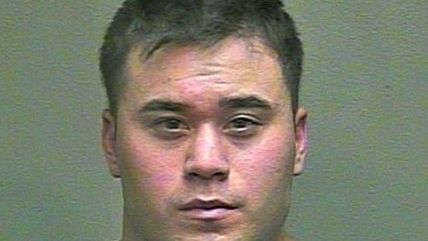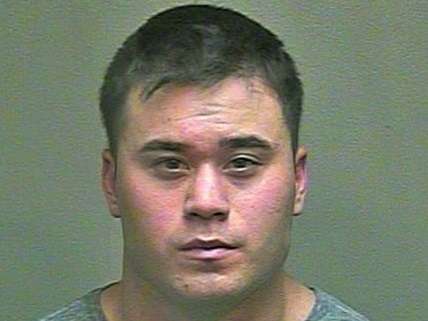Rapist Cop Daniel Holtzclaw Shows Why It's Wrong to Fixate on Campus Sexual Violence
Victims were poor women of color


Daniel Holtzclaw, a 29-year-old former Oklahoma City police officer, was convicted yesterday of raping eight women. He was found guilty on 18 of 36 counts—five other women accused him of assault and rape as well. His jury recommended a sentence of 263 years in prison.
His victims, according to BuzzFeed News, were mostly poor women of color. Many of them had been in trouble with the law before, and thought they would be disbelieved—or subjected to additional sanctions, or perhaps more violence—if they reported Holtzclaw's crimes. The officer took advantage of their vulnerability, frequently stopping them and then promising not to take them to jail in exchange for sexual favors. The testimonies of the women are chilling.
"I was scared," said one. "About him being an officer. I was nervous and I felt like even though I didn't have no warrants that he might make up something on me and send me into jail any way. I know that like I've been in trouble before, so I mean like, who am I to a police officer?"
"I didn't think nobody was going to believe me anyway," said another. "And I'm a drug addict, so the only way I knew to handle it was to go and get high to try to block it out, to make it seem like it didn't happen."
Hotlzclaw is a monster, and he's clearly a serial sexual predator. This, in fact, is exactly what serial perpetration looks like: the offender is someone with institutional power, and he chose his victims from among the most marginalized people in society.
But keep in mind that people like Holtzclaw are supposedly committing most of the rapes on college campuses, too—at least according to the under-scrutinized work of Dr. David Lisak, whose theories about serial college predators undergird the national outcry over campus sexual assault. In recent weeks, Reason has chipped away at that assumption by showing how Lisak's theory is based upon misleading data, exaggeration, and outright falsehood. No one is saying serial predators don't exist, just that the evidence supposedly demonstrating their prevalence on college campuses is scarce. Serial predators are out there, taking advantage of vulnerable women, but I highly suspect police departments are a better place to find them than college campuses.
Indeed, the conviction of Daniel Holtzclaw is a good reminder that law enforcement is plagued by a culture of sexual abuse. As Reason's Elizabeth Nolan Brown reported last month:
The Connecticut police officer who handcuffed and sexually assaulted a teen he met through a program for youth interested in becoming cops. The Florida officer who threatened more than a dozen immigrant men with deportation if they didn't sexually service him. The Oklahoma City officer who extorted sex from women he pulled over for traffic stops. These are just three of many, many sex crimes committed by U.S. police officers over the past several years. A new Associated Press investigation has turned up hundreds of officers fired for sexual offenses ranging from rape to voyeurism to possession of child pornography, and police policies both official and unofficial that make life easy for sex-predator cops.
"It's happening probably in every law enforcement agency across the country," Sarasota Police Chief Bernadette DiPino, who helped study the issue for the International Association of Chiefs of Police, told AP. "It's so underreported, and people are scared that if they call and complain about a police officer, they think every other police officer is going to be then out to get them."
It's also a good reminder that the supposed campus rape crisis has captured a disproportionate share of the outrage over sexual assault. While truly terrible things can and do happen to female students, they are less likely to become victims of violence than non-college women. That shouldn't be surprising; college students are among the most privileged people in modern society, and wealthy, intelligent people commit and suffer fewer violent crimes than the under-privileged. And yet the federal government is so worried about serial predators on campuses that it's forcing colleges to create extra-legal tribunals that have the power to expel accused students without even the pretense of due process. Sens. Claire McCaskill (D-Missouri) and Kirsten Gillibrand (D-New York) have proposed legislation that would exacerbate due process concerns. Meanwhile, many in the media remain captivated by campus rape allegations, some of them dubious.
It's great that Holtzclaw's victims received justice. The best thing we can do for women like them is to focus our efforts to reduce rape in places where we can do the most good, even if that cuts against the fact-free consensus that colleges are uniquely dangerous places.


Show Comments (35)